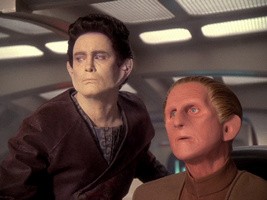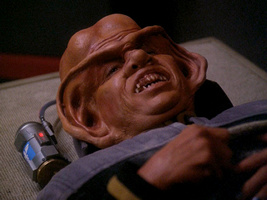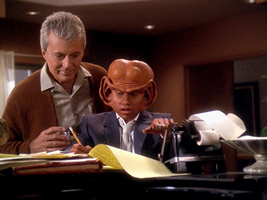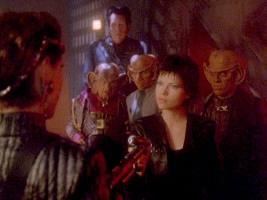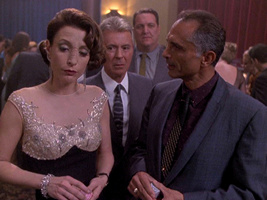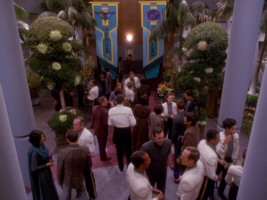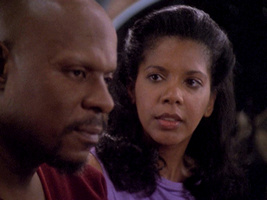Deep Space Nine (DS9) Season 7 Guest Reviews
Season 1Season 2Season 3Season 4Season 5Season 6Season 7
Take Me Out to the Holosuite
Synopsis
Stardate not given: Sisko's old rival, an arrogant Vulcan captain Solok, challenges Sisko to a baseball match, planning to humiliate Sisko.
Commentary
The first time I saw this episode was almost 13 years ago, and I was still too young to understand the implications of it. Now, after managing to collect all the episodes of all Star Trek series on DVDs in the last several months, and watching them, this episode definitely competes for my LEAST favourite one. I must say, I hate Vulcans. I hate EVERYTHING about them. From the first time Spock appeared in the Original Series, all the way to that scene of the destruction of Vulcan in "Star Trek (2009)" (the only good thing in that abomination of a movie), I saw Vulcans for what they are: a species of arrogant insufferable racists hiding behind their veneer of "logic". The DS9 episode "Take Me Out to the Holosuite" is a crown evidence of that. This episode is not about baseball (a game I don't understand at all, but that is beside the point). It is not about teamwork and competition, either. It is about how disgusting ALL Vulcans are, even those who hide their contempt of humans beneath their "logic" (and Solok is definitely not one of those who hide their contempt), and of Sisko's UNBELIEVABLE stupidity in actually thinking that he and his ragtag collection of misfits (Rom's performance was one of those moments when I didn't know whether to laugh or cry) could defeat Solok and his crew, and pay him back for all that humiliation he caused Sisko. Of course, if I were in Sisko's place, I would have wanted to "put Solok in his place" as well, but I would have found a way which would actually let me DO it, instead of simply humiliating me further. Leaving aside how idiotic Sisko was to challenge a Vulcan to a wrestling match, I would have reciprocated for Solok's psychology papers on comparative Human/Vulcan characteristics by writing a few papers of my own, in which I would describe Vulcans for what they are: walking zombies spending their entire existence shackled in their purgatory of "logic", because they are too weak to master their own emotions. Imagine living 300 years like that!? If that can even be called "life"? I would kill myself after a week of that nightmare! If I were in Sisko's place, I would throw all of these arguments in Solok's face when he came to DS9 and began demeaning Sisko once again.
Also, instead of Sisko's line "there is a Vulcan station about 50 light-years away", when he responds to Solok's observation how "inefficient" human officers are, I would say something like "you know, you are right. There is a Romulan Warbird scheduled to arrive later today (as I look at a padd), with considerable battle damage. I think I'll put them ahead of the T'Kumbra in the maintenance schedule. (looking Solok straight in the eye) And thank you, Captain Solok, for reminding me of the importance of efficiency. (looking at padd again) Oh, it looks like all the docking ports are reserved for damaged vessels for the next two weeks. Your ship doesn't appear badly damaged, captain, and we'll have to use your docking port for that Warbird. I'm afraid we won't be able to service your ship any time soon. (a slight, almost undetectable sneer on my face). Still, there is a Vulcan station about 50 light-years away, so they should be able to do something about your ship. And, of course, you won't have to put up with human inefficiency there, Captain Solok." After I thorougly enjoyed the look on Solok's face, he would have no choice but to leave... -the Defiant and its cloaking device- -some empty stretch of space between DS9 and the Vulcan station- -communications jammed- -sudden ambush on T'Kumbra- -a barrage of quantum torpedoes and pulse phaser bursts- -450 less Vulcans- -artificially created Dominion weapon signatures- -doing the entire galaxy a favour- Oh? Oh, sorry, just wishful thinking on my part...
But no. What did Sisko do, instead? He did EXACTLY what Solok wanted. He allowed Solok to bait him, he spent two pointless weeks badgering his senior staff, conditioning them for his "crusade" against Solok, giving them a pathetic little speech how they can defeat the physically superior opponent with "courage and heart" (his hesitation in the middle of it only showed how little he believed that himself), and then he finally allowed Solok the opportunity to humiliate him one last time, this time in Sisko's own game. I am giving this abomination one point only for the fact the I had a great time imagining what I would do in Sisko's place.
Annotations
- Remarkable dialogue: Kasidy: "I know that look. Its the -I'd really like to smash something but she'll think I'm crazy- look. Well, don't let me stop you... they're your quarters. Smash away if it'll make you feel better." - Sisko: "The only way I'll feel better is to beat Solok tomorrow." Worst thing is, he really believed he'll win and "feel better".
- Remarkable scenes:
- The introduction to the "Great Match", with an UFP anthem, and close-ups of Sisko's "crusaders". That look on Jake's face... he knew it was hopeless, and still was willing to participate in that debacle. I REALLY felt sorry for him. And Rom, of course, up on the stand, fully "in the moment". How utterly PATHETIC!
- In Quark's bar, after the match, Sisko and his team, and their "manufactured triumph". Their great "moral victory". The single worst case of denial I have seen in all of Star Trek!
Rating: 1 (Darko)
Take Me Out to the Holosuite
Synopsis
Stardate not given: Synopsis in main DS9 listing
Commentary
What did I just watch? Whatever it was, it wasn't Star Trek. (Actually, Memory Alpha says it was the TV show "Fame". Figures.)
Unlike Darko, I like Vulcans a lot. They're probably my favourite characters in the whole show; role models, in a sense. Their sense of logic and calm has always been awesome to me. Tuvok from Voyager is probably the best example of that. However, in this episode, those aliens can't be Vulcans, because they act like Romulans instead. What kind of logic is it to play a long-forgotten human game during their time off? Solok announcing that must have raised a whole lot of objections on the T'Kumbra. I'm sure Vulcans would rather play 3D chess or Kal-toh instead. And actually, it should have raised some objections on DS9 as well. The Vulcans are here to rest, but the DS9 senior staff is on the job! During a war!
Obviously this was supposed to be a silly filler episode, but it turns out to be farce. These can be done much better, for instance TOS: "The Trouble with Tribbles". But no, it had to be baseball. Not a global sport, like soccer, which the global audience would be likely to know, but baseball, which is mostly relevant in the USA. I still have no idea how it's supposed to be played, either. And then they even had Quark (who even voiced that he wasn't interested, but ended up playing anyway) and Rom on the team.
The "Niners" (was this another reference I missed?) lost, and that's probably the only *good* thing in this episode. The accidental bunt was ridiculous and Solok correctly noted that.
But the worst parts of the episode, that were completely anti-Star Trek, were two scenes: the first when Kasidy promises Sisko that she won't tell the story to others (for a very good reason! "Adolescent rivalry" is right!), and right after that tells the story to everyone anyway (and nobody bats an eye at that). The only thing to say here is to quote Picard's "the first duty of every Starfleet officer is to the truth" speech.
And the second was the "manufactured triumph" part. That was really, really low on the DS9 staff behalf. What they did was essentially bullying, taunting, as Solok noted himself. That's not much better from waiting for the best player on the opponent's team to leave and then beating him due to the lost match, in order to delude themselves into thinking they're somehow superior (but in reality becoming completely inferior).
So in my opinion, giving this episode a 1 is being way too generous.
Annotations
- Remarkable anthem: The Anthem of the United Federation of Planets. The irony? The Vulcans are one of the four founding races of the Federation. So that anthem must have been played twice in a row.
- Remarkable failure: Rom. I expected him to magically start doing good on that last shot there, as it often is the case, but no, even there he scored completely by accident. That's in stark contrast to how well engineering tasks tend to go for him.
Rating: 0 (GreatEmerald)
Treachery, Faith and the Great River
Synopsis
Stardate not given: "The One with the Two Weyouns"
Commentary
This is one of my favorite episodes, in many ways because I find Jeffery Combs endlessly entertaining. I love his (as Weyoun 6) interactions with Odo, and his (as Weyoun 7) interactions with Damar. Damar here is very much showing his eventual role as a Dominion-detesting revolutionary in his rather understandable hatred for his Vorta "associate". I find it interesting (and possibly a little over the top) that the loyal follower Weyoun 7 is less faithful to the wishes of the much more dangerous Female Changeling than the "defective model" Weyoun 6 is to the comparably harmless Odo. In fact, where Weyoun 7's faith seems phoned in, Weyoun 6's faith is entirely unshakable. It is also good to see more of a face given to the Vorta as a people. So far they have been remarkably vague, even as far as mysterious villains go.
I find it funny that the big bad Dominion that has to genetically engineer all of its friends, sucks at it so much. We've seen renegade Jem'Hadar, and (considerably more often) selfish, unfaithful, disobedient, or disloyal (defective) Vorta. I commend Combs as a character actor, portraying all four of these racial quirks in one episode, using two characters with the same face. I obviously expected the outcome of the Weyoun 6 plot, as I'm sure everyone else did, but I think I should still mention that I wish Weyoun 6 had become something more.
I also (God help me) find the semi-recurring situations like the one in the B-plot of this episode (citing "In the Cards" as a prominent example) to be very enjoyable. The B-plot was silly, yes, but I can't help it. I love it. Nog has always been one of my favorite characters simply because when he gets going, he never stops. This is what he did here, saving the day just in time and in a very entertaining and impressive way. I only wish more had been shown of his dealings and less of O'Brien's confused attempts to compensate for Nog's behavior. This show has made a bad habit of playing O'Brien as the fool, and quite frankly I don't like it. Why can't they ever show any of the good aspects in this poor man's life, if any even exist?
Annotations
- Nitpicking:
- Why didn't Odo try Weyoun's magic one-hit-kill trick on the Jem'Hadar ships that attacked later on as well?
- So I guess that the Rio Grande has magic Jem'Hadar one-hit-kill phasers, but not a recording device that could have been used to get Weyoun 6's testimony about the Dominion en route?
- Remarkable scenes: The scene in which it is discovered that Martok's blood wine is gone, followed by the one where Kira discovers Sisko's missing desk are the second and third most amusing scenes in this episode. The first is Weyoun 7's silent implication of Damar in the death of Weyoun 5.
- Remarkable inconsistency(?): Why is this the only time that we hear of the Vorta termination implant?
- Remarkable VFX: The icy asteroid in which Odo hides the Rio Grande in an attempt to escape his pursuers. The entire asteroid field was beautiful and very nicely done. One of my favorite non-battle effects of the series.
Rating: 7 (legendhiro)
The Siege of AR-558
Synopsis
Stardate not given: Synopsis in main DS9 listing
Commentary
If I give this episode any marks at all, they are exclusively for the believable and sympathetic portrayal of the dilemma of soldiers caught in some backwater fighting desperately against impossible odds, a very different speed than the space battles we see on DS9. This change of pace is quite positive, very much in line with the humane vision of Star Trek, and is especially apropos in the post-9/11 world.
On the other hand, the physical execution of the siege plot is a shade worse than pathetic. First, they are fighting in caves, again. Second, they are all Fleet officers, which is ridiculous and unbelievable. Would any modern navy take officers off its ships and say, "Hey, now you have to fight a land war for which you're neither trained nor equipped. Good luck."? Thirdly, for a "futuristic" war, their technology and equipment is pathetic even by comparison with average combat kit today. The fact that they are forced to rely on Nog's ears as their most reliable sensor system is a case in point. What about the sight Dax uses in "Field of Fire?" What about good old fashioned infrared goggles? What about UAVs? Furthermore, their phasers give away their positions without conferring the advantages established in TOS and TNG of extravagant power and wide-angle settings (which would take care of the Jem'Hadar charge). The list could continue indefinitely, but I trust the point is clear. I am not against the idea of taking Star Trek to war - it certainly helped shake up that simpering, rosy view of the perfect, ever-expanding Federation. I am simply against it being done badly and without competent military consultants.
Nitpicking: Pretty much covered. It saddens me to see Star Trek not keeping pace with the possibilities of present-day technology. Networked command and control systems with multiple input points are ever-improving. Every time a Jem'Hadar stabs a Starfleet officer, I wonder why carbon-nanotubule-laced (i.e. virtually unpiercable) uniforms are still in R&D in the 24th century, when the US military has been researching them since the 1990's. As a strictly in-universe point, if the Jem'Hadar can project attacking holograms and send mines through subspace, wouldn't that mean that they can in fact do anything anytime, projecting holographic camouflage for their forces or destroying the enemy with subspace weapons? And what about transporters?
Annotations
- Remarkable quote: "Let me tell you something about humans, nephew. They're a wonderful, friendly people, as long as their bellies are full and their holosuites are working. But take away their creature comforts, deprive them of food, sleep, sonic showers, put their lives in jeopardy over an extended period of time... And those same friendly, intelligent, wonderful people, will become as nasty and as violent as the most bloodthirsty Klingon." -Quark to Nog
- Great Moments: Quark continuing his criticism of the human capacity for violence, an ongoing theme of the Dominion War arc. Panicked Quark shooting a Jem'Hadar.
Rating: 4 (Anthony Rodger)
The Siege of AR-558
Synopsis
Stardate not given: Synopsis in main DS9 listing
Commentary
I agree with the brilliant Mr Rodger comment on this episode.
To be honest I resent DS9 to the core and so many episodes fuel that and this is no exception.
Like what he said, the Sisko and crew beam down and stay with the troops for simple bombastic support - as pointed out - naval officers may be trained to fight on land but the army are better trained because that is their nature.
Then there is the numerous stupid points - the discovery and capture of this relay post - you mean the Jem'Hadar did not purge and destroy the thing? No, of course not - it's too valuable to lose!! A lame excuse to justify the conflict that occurs.
The battle is neither exciting or impressive. Why? this is Star Trek - all the people we are not familiar with will die, all the characters we know won't. Simple.
Then as very well explained by again Mr Rodger, are the sensors and equipment that the Starfleet troops carry - as in none? No Body armour, grenades, sights of any kind, and the only thing they have are the naff bleeping whirring tricorders which in real war can be heard, traced, and even countermeasured. Also no bigger better systems - hell a modern iPhone can literally do what a Tricorder claims to be capable of!
The "Houdinis" are a clever idea but are also a pure gimmick - we never see them again, they are once again countermeasured with remarkable ease and even used against the thick Jem'Hadar.
The phaser rifles do give away positions, but use they do.
One can claim that this is the future and it would be different because Star Fleet are not warlike - well that argument is torched by ENT's MACOS with full backpacks and stun grenades! Plus numerous conflicts that came before this - it's just Bed & Breakfast trying to be clever.
When the inevitable finale comes to pass you can tell where it is going and it makes my gut sink - almost all the no names get killed, the "love interest" dies, the weak crewmembers of DS9 are easily beaten, but Sisko stands strong and takes them on - and clobbers many before his "dramatic" fall - PFFFFFFFFFFFFFFFFFFFFFFFFFFFFF! If that is not massaging an ego I do not know what is!
When it does end, its typically symbolised by the throwing of a dagger into the dirt and Sisko boasting "we held".
Never loses does he. >:(
Had the station been found to have been a decoy or was destroyed in the battle and Sisko take a more realistic beating, then I would be more forgiving - but Bed & Breakfast make it safe again!
Annotations
- Remarkable fact: Bill Mumy stars in this - Lennier from Babylon five! Also Will Robinson from Lost in Space.
Rating: 0 (chris)
It's Only a Paper Moon
Synopsis
Stardate not given: Synopsis in main DS9 listing
Commentary
Wow, this is a really light hearted and heavy episode. In the beginning we see Nog going through so many emotional problems, he's haunted by the memories of war, he's having problems with people who were his best friends, and he just wants to be alone. The real darkness of this episode is that Nog is suffering from something that happens to a lot of real life soldiers, and that many of them don't recover from. He enters Vic Fontaine's, for another episode that deals with emotional issues, but now these issues are darker than the last time we've seen Vic work things out, first love, now a war haunting. The producers are bringing out Vic for character development it seems, but not only of the ones we're used to, but also for the development of the Vic character itself. And Vic is developed a lot in this episode, we can see that he's given a life, and that he enjoys the basic things such as going to sleep at night and waking up in the morning, something most people take for granted. The episode inevitably moves to the controversy that Nog is getting too comfortable, and it becomes clear that when Ezri talks talks to Vic about it, he's unaware that it's happening. That is when he decides Nog needs a wake up call. It's nice that Vic is treated as a real character and not a hologram, it almost seems we're supposed to forget he's fake until there's some form of controversy about it. The culminating scene where Nog says all his feelings about the war nearly brought a tear to my eye, it's heavy enough to affect the heart in some way, no matter who you are.
Annotations
- Remarkable quote: "My son is insane! He's a one-legged crazy man!" (Rom about Nog staying in the suite, poking fun at the beginning where Rom is afraid to make Nog uncomfortable about his leg)
- Remarkable dialogue: "How can hiding in Julian's adolescent programs be a good sign?" - "Hey - it could be worse, he could be hiding in that Alamo program." - "...or that ridiculous secret agent program" - "Hey!" - "or that stupid Viking program." - "HEY!" (everyone referring to Julian's programs)
- Nitpicking: When Nog is asked what drink he wants, he says a Martini, now either synthehol allows for a lower drinking age limit, or Vic is giving Nog a few more privileges than on the outside.
- Remarkable character: Vic Fontaine could have easily become one of the stupidest characters in Trek, but turns out to be one of the best of all time, if I even began to list the memorable quotes by him the list would be longer than my review.
Rating: 8 (Hanzou)
The Emperor's New Cloak
Synopsis
Stardate not given: Synopsis in main DS9 listing
Commentary
Thank god this realm of tripe is over.
There are folk who love this "alternate universe" because it's dark, sexy, and the usual bunkum of love for a stupid idea. This time the Ferengi are involved which means loads of stupidity, clotting about, and the usual drooling over hot women they can never get. Throw in Ezri as the new love of The Intendant, loads of overacting, and hey presto! The final act of DS9: The Panto is over!
Who thought this was a good idea!??! Utter tripe!
In addition, I felt that this "alternate universe" is vile for another reason - one cited by Bernd here - that here people can ONLY be gay, and kinky, and always (surprise surprise) that they happen to be women, in sexy gear, with hot weapons.
There will be assholes who would defend DS9 despite its flaws and this horrid alternate universe - and say that I am a minority, that I do not know what I am talking about, I speak shit etc etc. Okay - so if they depict all the black characters as daft or devious unlike in the proper universe, is that acceptable? Or that all homosexuals are only in that place but no in our universe? What is it saying? One would disagree, so why tolerate that homosexuality is only regulated to women in this realm? They would squirm reasons. In truth, there is no justification. IF I was homosexual I would be outraged - and rightly SO!
NIL POINT!
Annotations
- Remarkable facts:
- Andrew J. Robinson was glad to see this version of Garak dead: "I was really, really, really happy about Garak's death. I never liked those alternate universe shows because that Garak was just a stupid bad guy. The thing that's great about our Garak is that he has subtext. There's a lot going on beneath the surface, and if you don't pay attention, then you're in trouble because he's got you. But the mirror Garak had no subtext. He was just a toady opportunist." Nicole De Boer however enjoyed her version of Ezri and wished it to continue - thank the stars it died here and now!
- LeVar Burton directed this - shame on YOU!
Rating: 0 (Chris S)
Badda-Bing, Badda-Bang
Synopsis
Stardate not given: Synopsis in main DS9 listing
Commentary
What the hell is this?
Sorry, there is a war going on, they are at the front per se, people are dying, and all the passť care about is a bloody holographic program?
I thought Star Trek was about exploring space, seeking out new civilizations, and to boldly go where no one has gone before. You know - science fiction?
Failing that, it's supposed to be about war.
Instead we have a program dedicated to a glitch in the irritating holosuite about Las Vegas over Vic Fontaine!! So in typical unbelievable fashion the crew of the station divert their attention from the war effort to save this! It's like Command and Control in Afghanistan concentrating all their time on making sure a character in World of Warcraft survives a battle with some ONLINE orcs rather than covering the backsides of real soldiers in combat!
Benny Sisko then gets involved because his girlfriend says some spiel about "saving friends". Part of him does not want to go to that program because of the racism of the era. God sake man, it's fake! Sides Kasidy's patronising cleansing of the past - please!
As well said by Bernd here, again history is wrongly glorified here. Typical Americans. So what we get is a "holo-reinactment" of "Ocean's Eleven" featuring the clots of DS9 out to save a holographic character from another holographic character! WTF!!?!?!? Despite some interesting costume changes and a few bits of humour, this is utterly pointless toss shoved in for no valid reason WHATSOEVER!
The final insult is Vic and Benny do a duet of Triumph! Thankfully that has not gone to CD - I hope.
"It's about a journey of friendship, self discovery, and that life has no boundaries for those who are willing to break them" - so goes the OTT American smaltz voiceover that would fit this dross.
Go away!
Annotations
- Remarkable facts:
- This episode was a pet project for Ira Steven Behr; "I'd wanted to do a caper show for years, but I'd never been able to pull it off. It was now or never - and with Vic Fontaine and a holosuite version of Las Vegas within reach, all the elements seemed to be in place." - in other words, he was not wasting HIS money on his vanity project!
- When this episode aired, Behr was well aware that there had been something of a fan backlash against Vic Fontaine; some fans loved him, but many despised the very concept of him. Behr specifically wrote Sisko's role to act as a surrogate for the fans who wouldn't accept Vic, with the idea being that if Sisko could be won over, then anyone could be won over. Yeah right...
- Benny Sisko can actually sing! According to Ira Behr, he had wanted Avery Brooks to sing on the show for some time, and after shooting this episode, Behr commented, "It's just jaw-dropping how good he is."
- This show didn't get a great reaction from some fans, many of whom commented that it fundamentally fails because the main characters are never in any real jeopardy, but Behr disagrees that this lack of jeopardy is a problem; "It didn't matter to us that the regular characters weren't in jeopardy. None of us wanted to do the old 'Holosuite-is-malfunctioning-and-we're-all-gonna-die' thing. We just wanted to do a show about helping this hologram." In fact, Behr saw the story as something of a commentary on how invested Star Trek fans can become in the characters; "In the same way that viewers have invested in the artifice of Star Trek and care about characters who aren't real, we decided to do a show about our characters caring about Vic." What tosh, more like people expected to see something called Science Fiction on a Science Fiction program methinks.
- Remarkable gaff: On Benny Sisko's controversial racial comment in this episode, Behr explains, "We didn't want the audience, especially youngsters to think that 1962 Las Vegas was a place where you had a lot of black people sitting in the audience at nightclubs, enjoying themselves at hotels, or casinos. That just didn't happen. So by having someone of Sisko's historical understanding questioning that fact, we could clarify before we got him to Vic's that he's well aware that Vegas was very, very, very white." So, explain the fact that the big eared Ferengi and Dr "not exactly white" Bashir have visited this suite numerous times, contradicts that very point!
- Remarkable sight: Ezri in a waitress dress!
Rating: 0 (Chris S)
Inter Arma Enim Silent Leges
Synopsis
Stardate not given: Synopsis in main DS9 listing
Commentary
The idea that in emergency circumstances it is sometimes necessary to compromise Federation values in the service of the Federation's perceived interests is one of Star Trek's core thought experiments. Is evil done in the name of "realpolitik" necessary to preserve good, or do these transgressions of core principles have the actual effect of destroying that good?
Stretching back to TOS, in "A Private Little War," Kirk believed he was forced to break the prime directive by creating and arming a pro-Federation faction on planet Neural to counter their opponents, whom the Klingon Empire was secretly arming. Was Kirk justified? The episode gives us little opportunity to explore the question. Written as an analogy to the contemporary war in Vietnam, the Kirk's solution was at minimum debatable.
By contrast with Kirk, Picard generally preferred not to compromise Federation ideals even at the cost of vital Federation interests. In TNG "The Wounded," Picard chose to allow the Cardassians to get away with skirting provisions of their treaty with the Federation, rather than make use of evidence gathered illegally by Captain Maxwell and the USS Phoenix. And in "The Pegasus," Picard preferred to expose Starfleet's breach of the Treaty of Algeron to the Romulans, rather than to allow clandestine research into cloaking technology to continue illegally.
Benjamin Sisko's position in Deep Space Nine is more nuanced, befitting the series' more thoughtful approach to political philosophy. In my opinion, DS9 "In the Pale Moonlight" is among the best episodes of Star Trek. Faced with the galacto-political reality that the Federation-Klingon alliance is losing the Dominion War, Sisko determines that the only path to victory requires bringing the Romulans into the war on the side of the Federation. However, once Sisko decides he is willing to compromise his ideals to achieve that end, he finds that ever more compromises are necessary. Darkly, having achieved his goal, Sisko decides that he must (and can) learn to live with what he has done.
"Inter Arma Enim Silent Leges" continues Deep Space Nine's more nuanced exploration of idealism vs. realpolitik. Both sides are given strong spokesmen: on the one side is Doctor Bashir, who is committed to the Federation's ideals, and on the other is agent Sloan of Section 31, who is prepared to commit any number of ethical violations and crimes to advance perceived Federation interests. As the debate stagnates, Sloan says to Bashir, "Let's make a deal, doctor. I'll spare you the 'ends justify the means' speech and you spare me the 'we must do what's right' speech. You and I are not going to see eye to eye on this subject so I suggest that we stop discussing it." Throughout the episode, both aggressively argue their positions and to the credit of the writers, neither is proved right or wrong by the events of the episode - the question is left to the viewer to decide.
Doctor Bashir was a good choice as the central player in this episode. Through seven seasons, Bashir's connection with Garak has developed the doctor's interest in clandestine secrets and spying, which has also been played out in his James Bond style holodeck fantasies. But in the end, Bashir refuses to give into these inclinations and remains true to his principles. To Bashir's chagrin, Sloan had anticipated that response and made his plans accordingly.
The revival of Section 31 in Star Trek: Discovery (and the threatened Section 31 spin-off series) has led me to go back and review its establishment in the canon in Deep Space Nine. As established in Deep Space Nine, Section 31 is very officially off-book. Starfleet is ostensibly working to track down and eliminate Section 31 as a rogue organization. However, in practice, few in Starfleet Command prioritize efforts against an organization fighting in the Federation's interests, albeit from outside its core values. Much of Federation leadership actively turns a blind eye to Section 31 and apparently many (like Admiral Ross in "Inter Arma") are actively compromised, secret supporters.
In the short-term, Section 31's intervention in the Romulan government in this episode may have succeeded in keeping the Romulans in the war and defeating the Dominion. However, in the longer term, it seems possible that this intervention led to the destabilization of the Senate and Shinzon's coup ("Star Trek: Nemesis") and ultimately even to the destruction of Romulus ("Star Trek 2009" and Star Trek: Picard). Considering the fact that Ambassador Spock thought that the Romulans were on the cusp of an enlightened philosophical revolution (TNG: "Unification"), the ultimate cost of the intervention is incalculable.
The number of admirals who choose to sacrifice the Federation's principles for its perceived interests are many: Admiral Kennelly (TNG: "Ensign Ro"), Admiral Nechayev (TNG: "Descent"), Admiral Pressman (TNG: "The Pegasus), Admiral Leyton (DS9: "Homefront"), and Admiral Dougherty (Star Trek: Insurrection) to name just a few. Since so many in Starfleet Command have come to the same conclusion, it only made sense for the writers of Deep Space Nine to organize the theme under the banner of Section 31. (Extra-canonically, leaders like Pressman have been retconned to have been a part of Section 31.)
While I believe that this should continue to be explored as a central theme in Star Trek, I don't think an entire spin-off series is warranted. In the same way, despite the fun of several episodes set in the "Mirror Universe" in DS9 and ENT, I was disappointed by its emphasis as the major plot point of Discovery Season 1 and I would definitely oppose having an entire series set in the Mirror Universe.
My hope with Section 31 going forward is that the writers use "Inter Arma Enim Silent Leges" as a template: the question between Sloan and Bashir is not settled. I am personally on the side of Picard and Bashir. Sloan no doubt believes his own rhetoric to Bashir that Section 31 exists because "someone has to protect men like you from a universe that doesn't share your sense of right and wrong," but I agree with Bashir that Sloan's abrogation of Federation principles can't be justified by the short-term gains.
Sloan believes he's gotten a fair price for selling his soul, but the consequence remains that he now lacks a soul. If a Section 31 show ever materializes, I hope the writers keep this ideological tension at the heart of the series.
Rating: 9 (John Hamer)
Penumbra
Synopsis
Stardate 52576.2: Synopsis in main DS9 listing
Commentary
Penumbra is the starting point of the arc that concludes in "What you Leave Behind". And it's a rather contrived putting of pieces in place. The Ezri/Worf storyline stretches credibility in many ways as Bernd points out in his review. But the pieces of the story fare better. Damar is wonderful in his role of despot against Weyoun. Dukat becoming Bajoran is also a bit contrived too. The other couple, Sisko/Kasidy come out better from the story, and the involvement of Sarah is logical although Sarah comes across a bit flat in the vision scene.
So, a rather contrived but necessary episode that sets up the series for the satisfactory conclusion to come.
Rating: 5 (simon)






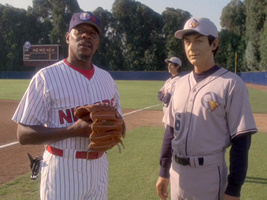
 "Take Me Out to the Holosuite"
"Take Me Out to the Holosuite"